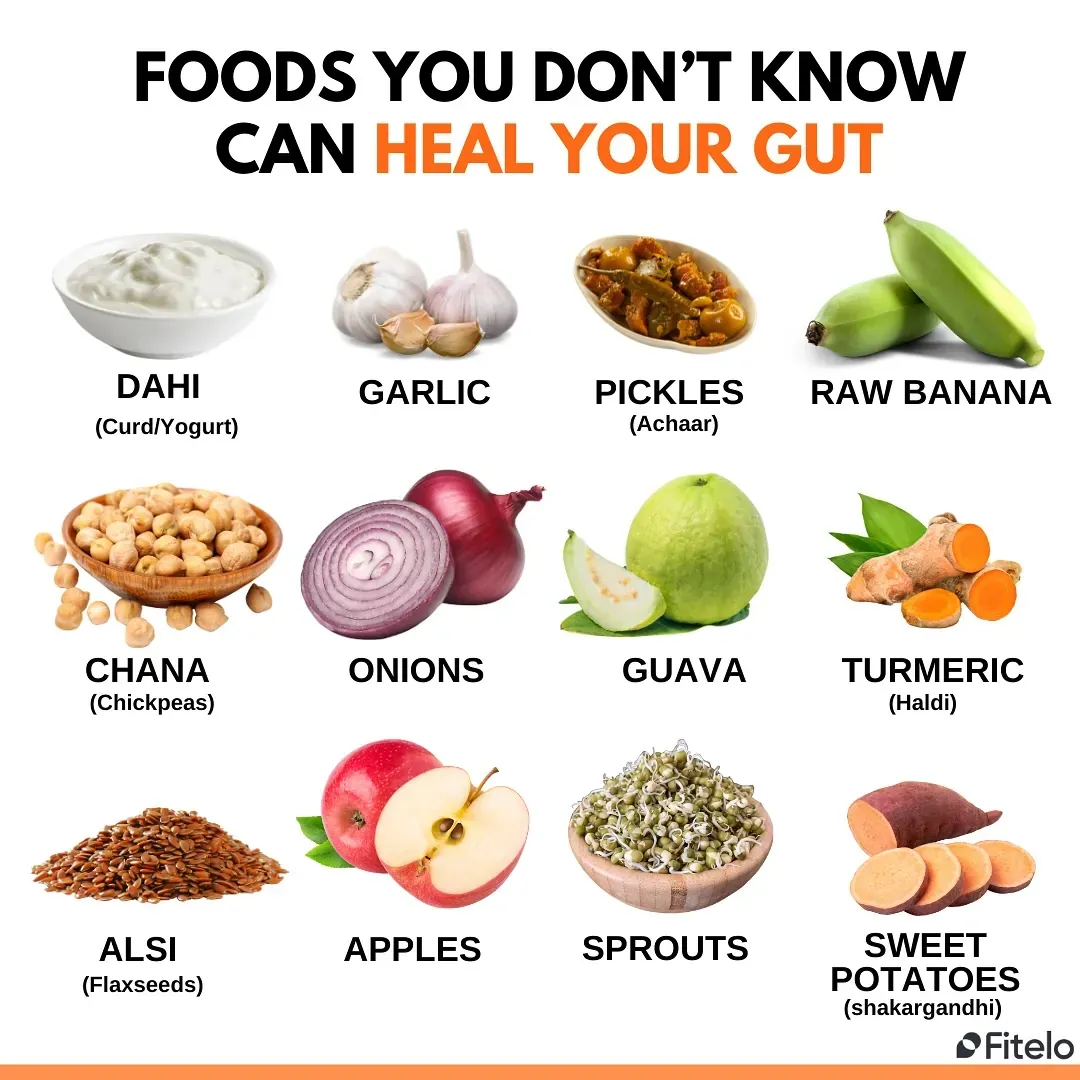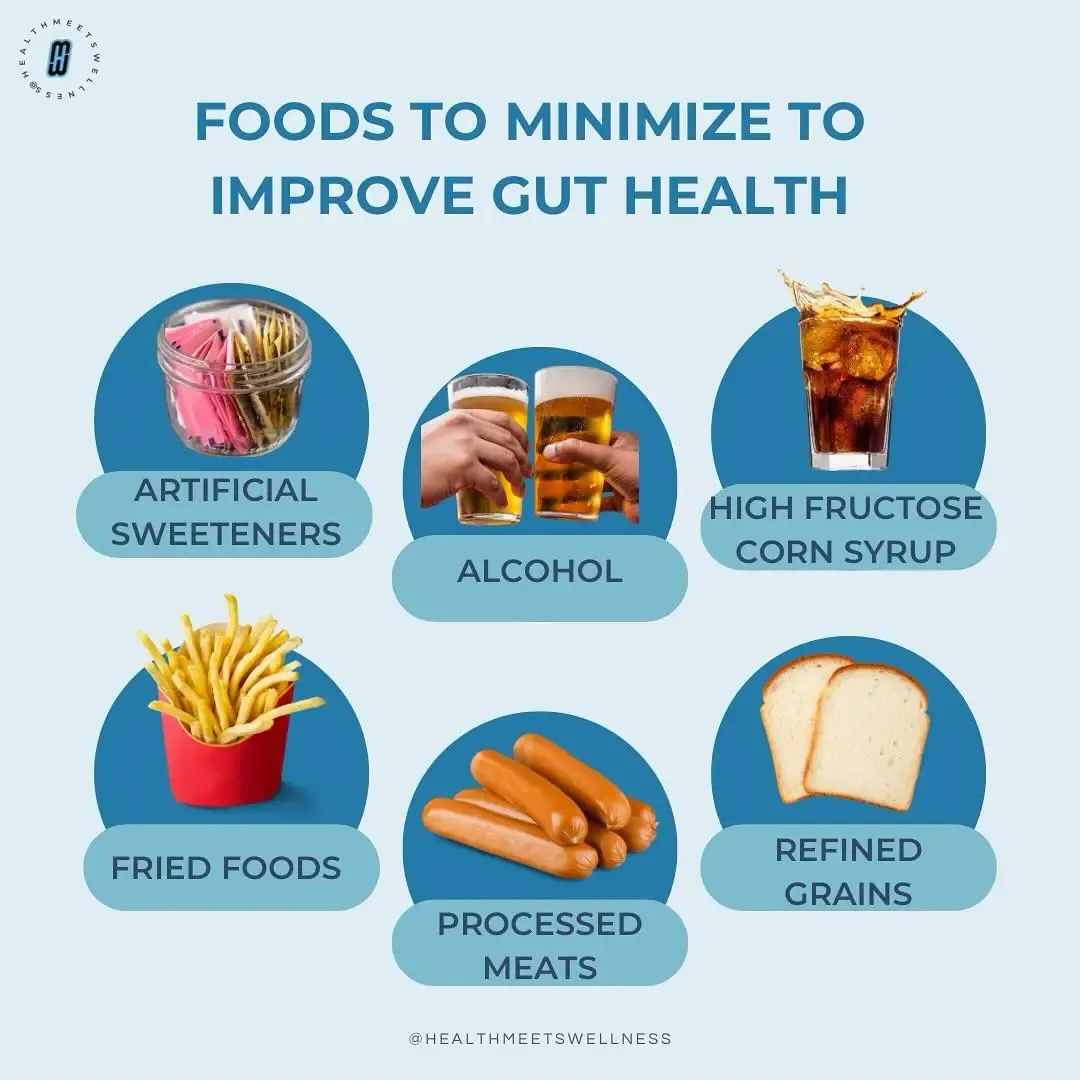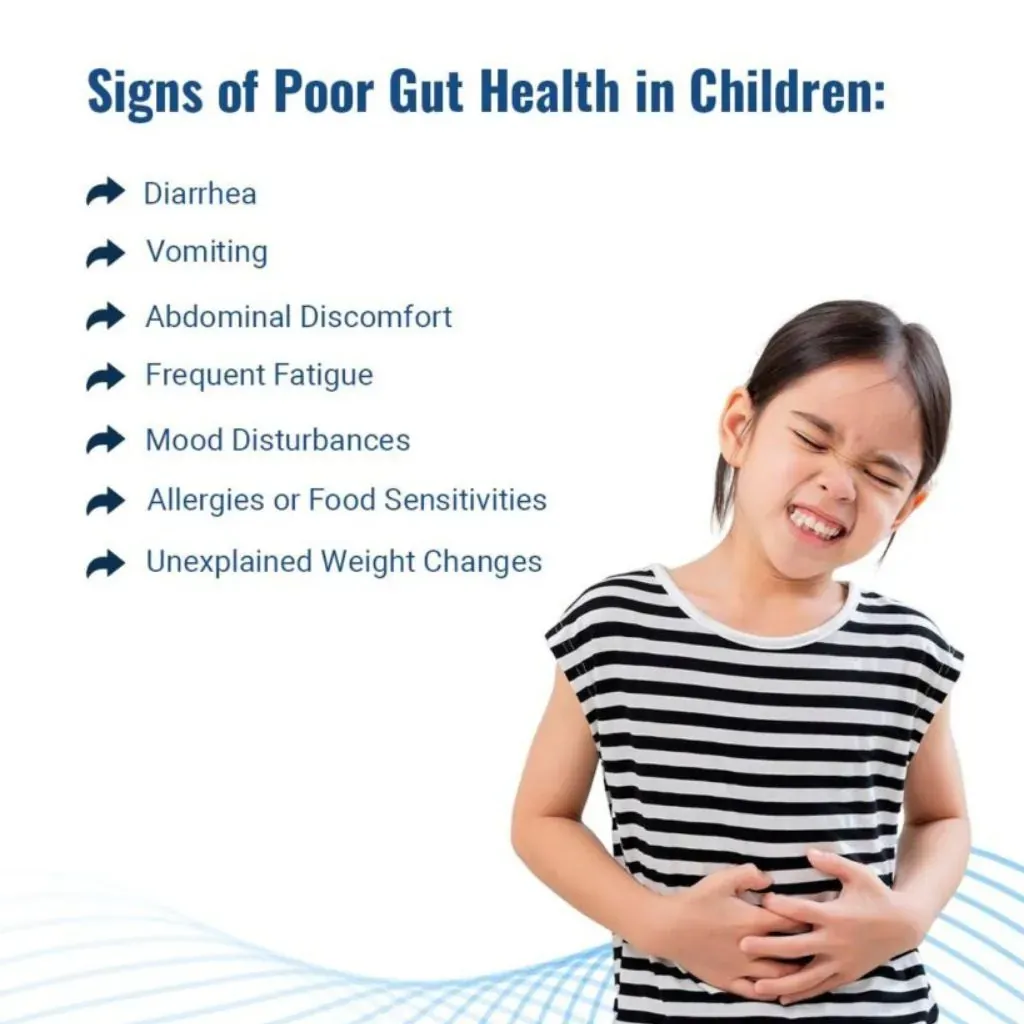
IG Credit:@microbiome.in
Gut health refers to the various types of efficiency of your digestive system. It involves the proper bacterial balance in your stomach and intestines, which aids in food digestion, nutrient absorption, and waste elimination.
A balanced gut strengthens your mood, boosts your energy, and reduces bloating and constipation.
Eating fruits, vegetables, whole grains, and yogurt, alongside drinking plenty of water, can aid in keeping your gut healthy.
In addition, a healthy gut helps the immune system remain strong and combat diseases.
What is Gut Health
Gut health means that the entire gastrointestinal (GI) tract is working properly, including the gut microbiome, which is the community of trillions of microorganisms (some estimates are closer to 38 trillion!) that live in your intestines, including bacteria, viruses, fungi, and other microbes.
A healthy gut harbors a diverse, stable community of beneficial bacteria that aids in digestion, nutrient absorption, immune function, and mental health via the gut-brain axis.

IG Credit:@prakrutiwellnesscentre
When the gut is functioning well, digestion and absorption processes are moving along with ease, the immune system is healthy, the body is able to regulate inflammation, and overall, the individual experiences little digestive distress, such as bloating, constipation, or heartburn. The healthy gut microbiome is important for vitamin and neurotransmitter production, which protects against bad pathogens and affects our mood and cognition. A healthy gut should contain a variety of fiber, fermented foods, probiotics, regular exercise, hydration, stress management, and avoidance of excess antibiotics and processed foods.

IG Credit:@happygut.dietitian
Symptoms of Bad Gut Health
Gut health issues can manifest themselves in numerous physical and emotional symptoms. Common signs include:
- Gut Problems: If you experience excessive bloating, gas, constipation, diarrhea, or heartburn on a regular basis, your microbiome might not be in the right place.
- Food Intolerances: Not being able to digest foods may indicate that you lack certain bacteria in your gut.
- Unexpected Weight Changes: Unexpected weight gain or loss can occur when the gut is unhealthy and interferes with nutrient absorption or fat storage as it should.
- Fatigue or Sleep Disturbances: A slump in gut health affects the production of serotonin which handles sleep and mood regulation.
- Skin Issues: Eczema, itching, or any other skin trigger may be linked to a gut-triggered inflammation.
- Autoimmunity Issues: A leaky gut can lead to higher levels of inflammation in your body, which contributes to immune dysregulation.
- You get sick more often – An unhealthy gut microbiome affects your immune defenses.
- Confusion or Mood Changes: If your gut is not healthy, it can cause you to be unable to think straight, be irritably impatient and contribute to anxiety or depression.
- Bad Breath (Halitosis): Caused by impaired digestion or excessive growth of harmful gut bacteria.
- Sugar or Junk Food Cravings: Some bacteria in your gut are sugar bugs and create very powerful cravings.
If many of those symptoms are present, then your gut health may be out of balance, and you may want to consider adjusting your diet or your lifestyle, or seeking medical attention.
Foods Good for Gut Health
| Food | Benefits for Gut Health |
| Yogurt | Contains probiotics that restore the balance of good bacteria in the gut |
| Kefir | Probiotic beverage; this helps to balance the microflora of the gut |
| Sauerkraut | National probiotic and fiber from fermented cabbage Good for digestion. |
| Kimchi | Spicy fermented vegetables that support gut flora and reduce inflammation. |
| Miso | Probiotic-rich fermented soybean paste enhances gut health |
| Tempeh | Encourages gut lining; fermented soy product with probiotics and protein |
| Bananas | Rich in prebiotics (inulin) Nourishes beneficial colonic bacteria |
| Garlic | Includes prebiotics that help good gut bacteria grow. |
| Onions | High in prebiotics and antioxidants. Supports immune and digestive health. |
| Asparagus | Prebiotic fibre strengthens good bacteria while also promoting normal bowel regularity. |
| Apples | Have pectin, a dietary fibre that has a prebiotic effect and improves digestion. |
| Berries | Rich in polyphenols and fiber, supports healthy bacteria and decreases gut inflammation |
| Whole Grains | Offer fiber substrate Maintain and promote regular stool and healthy gut flora. |
| Ginger | Aids in decreasing inflammation and aids digestion |
| Bone Broth | Has gelatin & amino acids that aid gut lining repair |
| Green Tea | Contains polyphenols; it improves good and decreases bad gut bacteria. |
| Chia Seeds | Rich in fiber and omega-3 fatty acids They promote digestion and serve as prebiotics. |
| Pickles (fermented) | We also do brine fermentation. Which has natural probiotics that help maintain gut microbial balance. |
| Dark Chocolate | Provides polyphenols and fiber that nourish good bacteria in the gut. |
| Legumes (beans, lentils) | Rich in fiber and resistant starch Helps feed good bacteria |

IG Credit: @pippaskitchenau
Best Time to eat sauerkraut for Gut Health
Early Morning on an Empty Stomach
- Starting your day with plain sauerkraut on an empty stomach helps probiotics get through the digestive tract interference less and reach the intestines easily.
- This fosters optimum colonization of good bacteria and cues improved digestion for the rest of the day.
Pre-Main Meal (10-15 Minutes Before the Meal)
- Eating a spoonful of sauerkraut before a meal activates the digestive system by increasing stomach acid and enzymes.
- The probiotics will then settle down as your digestive system will slowly become more efficient as well, better digestion and more efficient nutrient absorption (especially of proteins and fats) being the outcome of this process.
Alongside Meals
- Eating sauerkraut with your meal provides natural digestive assistance.
- The beneficial bacteria present in sauerkraut helps digest food quickly and reduce the likelihood of bloating, gas, and discomfort after heavy meals.
Evening time, but not so close to bedtime
- Having sauerkraut during the early evening can help with digestion and gut repair overnight.
- But do be cautious of eating it too near to bedtime as this may trigger acid reflux or subsequent digestive discomfort (especially if prone to sensitive stomachs).
Consistency Through Small Amounts Daily
- Frequent small doses (1–2 tablespoons/day) are better than large doses less frequently.
- Regularity helps maintain a steady influx of probiotics, allowing the digestive tract to stay balanced and strong over the long haul.

IG Credit: @healthfarm_nutrition
Frequently Asked Questions
Q: Why this type of carb is good for Gut Health?
Longer chain carbohydrates, like resistant starches and dietary fiber, are often touted as healthy gut-feeding prebiotics that help microorganisms flourish in your colon. Instead of being digested in the small intestine, they ferment (fan a good gaseous flame for the gut!) in your large intestine, stimulating the gut-friendly bugs, enhancing digestion and generating short-chain fatty acids (SCFAs) such as butyrate, that nourish your colon whilst down-regulating inflammatory mediators (not that I would know anything about this!).
The gut microbiome is important due to its significant role in digestion, immune system and function, nutrient absorption, and even mental health. A healthy and diverse microbiome combats pathogenic bacteria, synthesizes vitamins (e.g., B and K), regulates inflammation, and communicates with the brain along the so-called gut-brain axis. Microbiome dysbiosis has been implicated in diseases including obesity, diabetes, IBS, anxiety, and depression.
If you want to recover your gut health after antibiotics, decide to:
- Consume probiotics found in yogurt, kefir, and fermented vegetables.
- First, we need to replenish good bacteria, take high-quality probiotics supplements,
- Eat prebiotic fibers (serve as food for good bacteria, eg in garlic, onions, bananas)
- Refrain from processed foods and added sugars as they tend to feed the bad bacteria.
Stay hydrated, and consume whole, fiber-rich foods; this promotes the regrowth of a healthy microbiome.
- Stop drinking booze to give the intestinal tract a chance to rest
- Consume anti-inflammatory and gut-repairing foods, including, bone broth, leafy greens, and fermented foods.
- Repopulate: Fill the void with probiotics and restore microbial homeostasis.
- Stay hydrated, and eat foods high in fibre for better digestion.
- Both of which help support gut and liver function.
The gut health “Morning Trio” typically includes taking:
- Add a probiotic to get good bacteria in there.
- A splash of apple cider vinegar or lemon water to help digest and stimulate stomach acid
- A source of prebiotic fiber (i.e., psyllium husk or chia seeds) to act as food for the probiotics.
Together, this trio gets your digestive system going, encourages regularity, and keeps your gut flora balanced all day, every day.
To aid digestive health, dilute 1–2 tablespoons raw unfiltered apple cider vinegar in a glass of warm water and consume the mixture 15–30 minutes prior to eating. This can promote stomach juice secretion, it can help in digestion, and therefore promote the growth of beneficial gut microorganisms. Always make sure you dilute it and begin with small quantities if it irritates.
Sourdough is gut-friendly because it is high in nutrients, balsamic acid, and it yeast and lactobacilli due to the natural fermentation process. During this process, gluten and phytic acid are broken down, as a result, this baking method yields a bread that is easy to digest and richer in nutrients. Also, the fermentation process adds good bacteria that help with gut health and bloating.
When this obsession goes too far — and encourages pointless elimination or supplementation tactics or unnecessary food anxiety — we may have a gut health problem on our hands. Not everyone requires pricey probiotics, high-stakes eating plans, or everyday gut testing. Gut health is essential, but obsession with it is often futile (and harmful)—particularly if it is based on misinformation or marketing fads—and balance and tailored nausea are crucial.
Gut health is crucial as the gut is responsible for multiple vital roles: digestion of food, absorption of nutrients, pathogen defense, mood modulation through the gut-brain axis, and immune health. Good gut health protects against diseases, promotes energy, and provides overall wellness.
To improve gut health:
- Increase fiber intake from fruits, vegetables, legumes, and whole grains.
- Add fermented dairy or plant-based foods like yogurt, kimchi, and sauerkraut.
- The negative effect of gut flora can be minimized with reducing antibiotics and processed food.
- Drink plenty of water, exercise, de-stress.
- Make sure you are sleeping properly and take probiotic supplements in case needed.
Naturally fermented pickles (not just vinegar-pickled) are gut-friendly. It has live probiotics having the capacity to improve gut flora and help with digestion and the immune system. Seek out naturally fermented options (you should see labels that say “contains live cultures”) and steer clear of added preservatives or pasteurization.
- Probiotic Foods (yogurt, kefir, kombucha, kimchi)
- This a healthy flatulence diet option (bananas, garlic, onions, oats)
- Fiber-rich foods of whole plant origin
- Staying active, hydrated, and well-rested
- Reducing stress and not exposing yourself to unnecessary antibiotics
- This nourishes healthy bacteria and keeps your digestive system on track.








